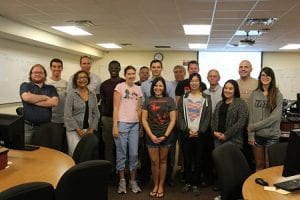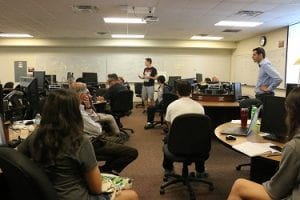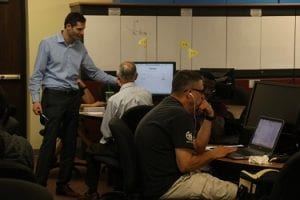Physics Hosts Teaching & Data Workshops

In an effort to transform classroom learning, the UCF Physics Department hosted a PhysTEC and Project CODER workshop from June 13-17 at UCF.

Adam LaMee and Sergei Gleyzer speaking to the participants about CMS OpenData.
The first two days of the workshop was hosted by UCF’s PhysTEC program (Physics Teacher Preparation Program); a partnership between the American Physical Society (APS) and the American Association of Physics Teachers (AAPT) created to help universities transform their physics teacher education programs into national models.
From Monday to Tuesday, UCF PhysTEC Teacher-in-Residence, Adam LaMee led in-service physics teachers and UCF students interested in the field of classroom teaching through research and policy discussions and the performance of standards-based classroom activities. This was the second year UCF PhysTEC hosted the workshop designed and implemented by LaMee, and thanks to funding by the NSF, a number of participants were offered stipends to attend as well as 12 hours of in-service credit.
“The PhysTEC workshop focused more on methods than programming,” said UCF physics alumnus and new Discovery High School physics teacher, Christopher Tiller, ’15. “It was very relevant for me since I’m just starting out. I got a lot of information on how to approach an experiment and how to approach ideas.”
The final three days of the workshop involved Project CODER, a programming and particle physics workshop initiated by Adam LaMee, and University of Florida particle physicist and researcher, Sergei Gleyzer. LaMee and Gleyzer, who studied at FSU together, collaborated on the inception of Project CODER.
Project CODER is a CMS OpenData workshop that provides a first of its kind opportunity for teachers and students to be trained to use CERN OpenData. CERN (Conseil Européen pour la Recherche Nucléaire) is an international laboratory of particle physics research located in Europe. Home to the Large Hadron Collider (LHC), CERN uses particle detectors such as Compact Muon Solenoid (CMS), to record collision properties, aiding in the study of laws of the universe. These data are free and accessible to the public for analyzing, education outreach, and potential discoveries.

Participants such as high school physics teacher, Stan Cutler, work on their virtual notebooks in the CMS OpenData workshop.
“A unique angle about this workshop is that it’s bringing particle physics to our students and teachers in a way they weren’t able to consider,” explained LaMee. “There’s this big push for programming and coding in schools and the question is, ‘How do we make that happen?’ So, the teachers here are starting to figure out what that might look like in their classes.”
For the next three days, participants learned about new programming technology, interpreted histograms, and adapted CMS OpenData to classroom activities and standards using research-based practices. Stipends were offered once again to a number of participants along with 18 hours of in-service credit.
“It’s wonderful,” said Gleyzer. “The idea is to get young people excited and to analyze the data which are available to them for free. Participants were taking the notebooks we created and modifying them to analyze the data themselves. That was really nice to see. ”
Educators like Lake Brantley High School physics and science teacher, Stan Cutler, found that these kinds of workshops allowed for insightful discussion from teachers alike. “There were some share sessions earlier in the week where we passed along some of the things that individual teachers do for their classroom—some of those that I will definitely use.”
LaMee and Gleyzer will lead the Project CODER workshop at the University of Florida from August 1- 3.
To learn more about CERN and Project CODER, click here. To learn more about UCF Physics Teacher Preparation Program, click here.
